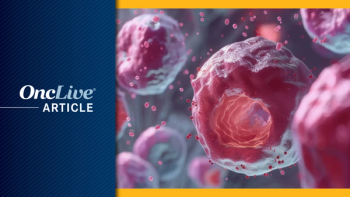
Adjuvant Pembrolizumab Induces RFS Benefit in Resected High-Risk Stage II Melanoma
Adjuvant pembrolizumab led to a significant reduction in the risk of disease recurrence or death compared with placebo in patients with resected, high-risk stage II melanoma.
Adjuvant pembrolizumab (Keytruda) led to a significant reduction in the risk of disease recurrence or death compared with placebo in patients with resected, high-risk stage II melanoma, according to results from the phase 3 KEYNOTE-716 trial (NCT03553836) that were presented during the 2021 ESMO Congress.1
The median recurrence-free survival (RFS) was not reached (NR) with pembrolizumab (95% CI, 22.6–NR) or placebo (95% CI, NR–NR; HR, 0.65; 95% CI, 0.46-0.92; P = .00658). The 12-month RFS rates were 90.5% vs 83.1%, respectively.
Findings from an RFS sensitivity analysis that included new primary melanomas demonstrated similar findings (HR, 0.64; 95% CI, 0.46-0.88).
Notably, pembrolizumab improved RFS across most key subgroups analyzed.
“KEYNOTE-716 met its primary end point of RFS at the first protocol-specified analysis,” lead study author Jason J. Luke, MD, FACP, an associate professor of medicine in the Division of Hematology/Oncology and director of the Cancer Immunotherapeutics Center at UPMC Hillman Cancer Center, said during a virtual presentation of the data. “Despite this trial hitting its primary end point very early, there are a number of patients who are censored later in the curves. We will continue to see these data mature, and in fact, it is our full expectation that these curves will continue to separate over time.”
The risk of disease recurrence remains high for patients with stage IIB and IIC melanoma.
“High-risk features of primary melanoma include the depth of invasion, T-category, as well as ulceration, such that at 5 and 10 years the melanoma-specific survival observed is similar between stage IIB and IIC compared with IIIA and IIB melanoma,” Luke said.
Pembrolizumab was approved by the FDA in February 2019 for use as adjuvant treatment in patients with melanoma with lymph node involvement following complete resection.2 The regulatory decision was based on findings from the phase 3 KEYNOTE-054 trial (NCT02362594), in which adjuvant pembrolizumab led to a statistically significant improvement in RFS vs placebo in patients with resected stage III melanoma (HR, 0.57; 98.4% CI, 0.43-0.74; P < .0001). At 3.5 years of follow-up, the distant metastasis-free survival (DMFS) rates were 65.3% and 49.4%, respectively (HR, 0.60; 95% CI, 049-0.73; P < .0001).3
To be eligible for enrollment on the KEYNOTE-716 trial, patients needed to be aged 12 years or older with newly diagnosed, resected, high-risk, stage II melanoma and have an ECOG performance status of 0 or 1.
Participants were randomized 1:1 to receive 200 mg of adjuvant intravenous pembrolizumab every 3 weeks or the pediatric dose of 2 mg/kg vs placebo for 17 cycles.
“Patients were required to submit baseline diagnostic melanoma tissue at the time of accrual if available,” Luke said. “[Because of] inconsistent and small amounts of tissue, there is no prespecified analysis for PD-L1 status or BRAF status in the clinical trial.”
Patients were stratified by T-category (3b vs 4a vs 4b) and pediatric status. The primary end point of the study was RFS per investigator assessment, with DMFS, overall survival, and safety serving as key secondary end points. Health-related quality of life (QOL) served as an exploratory end point of the study.
Overall, 976 patients were randomized. Of the 483 patients treated with pembrolizumab, 133 had treatment ongoing at 14.4 months of follow-up (range, 1.5-26.4) and 206 had completed treatment. Additionally, 144 patients discontinued pembrolizumab because of adverse effects (AEs; m = 75), patient withdrawal (n = 38; n = 3 were COVID-19 related), relapsed/recurrent disease (n = 21), physician decision (n = 6), and protocol violation or other reasons (n = 4).
Of the 486 patients treated with placebo, 152 had treatment ongoing at 14.3 months of follow-up (range, 1-26) and 229 had completed treatment. Additionally, 105 patients discontinued placebo because of AEs (n = 20), patient withdrawal (n = 25; n = 5 were COVID-19 related), relapsed/recurrent disease (n = 54), physician decision (n = 4; n = 3 were COVID-19 related), or protocol violation or other reasons (n = 2).
Baseline characteristics were balanced between arms. In the pembrolizumab arm, patients were a median age of 60 years (range, 16-84); 0.2% of patients (n = 1) was aged between 12 and 17 years, and 37.8% of patients (n = 184) were aged 65 years or older. In the placebo arm, patients were a median age of 61 years (range, 17-87); 0.2% of patients (n = 1) were between 12 and 17 years old, and 39.7% of patients (n = 194) were aged 65 years or older.
Across both arms, the majority of patients were male, had T3b disease, and stage IIB disease.
Additional findings regarding patterns of recurrence in the pembrolizumab arm demonstrated that 88.9% (n = 433) did not have a recurrence event; of the 11.1% (n = 54) who had a recurrence event, 6.4% (n = 31) were regional recurrences in the skin or lymph node and 4.7% (n = 23) were distant recurrences. In the placebo arm, 83.2% (n = 407) of patients did not have a recurrence event; of the 16.8% of patients who had a recurrence event, 8.4% (n = 41) were regional recurrences in the skin or lymph node and 7.8% (n = 38) were distant recurrences.
“Patterns of recurrence are of particular interest in KEYNOTE-716 given the lack of historical robust data describing this stage II population,” Luke said.
Regarding safety, any-grade AEs were observed in 93.0% of patients treated with pembrolizumab and 89.1% of patients treated with placebo. Any-grade treatment-related AEs (TRAEs) were reported in 79.9% vs 60.9% of patients, respectively. Of these, 16.1% vs 4.3% were grade 3/4 events. Additionally, 15.3% vs 2.5% of TRAEs led to treatment discontinuation, respectively. No deaths from TRAEs were reported in either arm.
Common TRAEs in both arms included hypothyroidism, hyperthyroidism, diarrhea, nausea, fatigue, asthenia, arthralgia, myalgia, decreased alanine aminotransferase, decreased aspartate aminotransferase, pruritus, rash, and maculopapular rash. AEs of interest included hypothyroidism, hyperthyroidism, colitis, adrenal insufficiency, hepatitis, hypophysitis, infusion reactions, myasthenic syndrome, myositis, nephritis, pancreatitis, pneumonitis, sarcoidosis, severe skin reactions, thyroiditis, and type 1 diabetes mellitus (T1DM).
AEs of interest that required management with hormonal therapy were reported in 18.6% (n = 90) of patients treated with pembrolizumab. The AEs requiring treatment included hypothyroidism (13.9%; n = 67), thyroiditis (1.2%; n = 6), hypophysitis (2.1%; n = 10), adrenal insufficiency (2.1%; n = 10), and T1DM (0.4%; n = 2).
“Within in the thyroid events, we see this group of patients who had thyroid events despite the placebo treatment, suggesting that even in the background for normal patients in this monitoring period of a clinical trial a rate of about 4% to 5% of thyroid-based events would be expected,” Luke said.
Regarding the exploratory end point, global health status/QOL scores were similar between the pembrolizumab and placebo arms at all timepoints.
References
- Luke JJ, Rutkowski P, Queirolo P, et al. Pembrolizumab versus placebo after complete resection of high-risk stage II melanoma: efficacy and safety results from the KEYNOTE-716 double-blind phase 3 trial. Presented at: 2021 ESMO Congress; September 16-21, 2021; Virtual. Abstract LBA44.
- FDA approves pembrolizumab for adjuvant treatment of melanoma. News release. FDA. February 15, 2019. Accessed September 18, 2021. https://bit.ly/3jTx0c5
- Eggermont AMM, Blank CU, Mandalà M, et al. Adjuvant pembrolizumab versus placebo in resected stage III melanoma (EORTC 1325-MG/KEYNOTE-054): distant metastasis-free survival results from a double-blind, randomised, controlled, phase 3 trial. Lancet Oncol. 2021;22(5):643-654. doi:10.1016/S1470-2045(21)00065-6



































